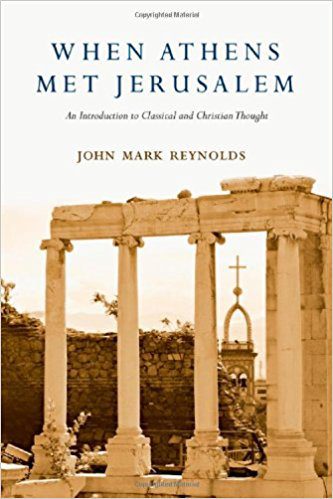 In the center of God’s educational program for humanity were the Jewish people. For centuries God worked to guide one people to become human teachers for all of humankind. God wished for consent and a loving relationship. He had to teach the very vocabulary of liberty and be patient as time was lost by bad decisions.
In the center of God’s educational program for humanity were the Jewish people. For centuries God worked to guide one people to become human teachers for all of humankind. God wished for consent and a loving relationship. He had to teach the very vocabulary of liberty and be patient as time was lost by bad decisions.
While God prepared to send His Son as a Jewish man, the centeral Revelation of history, His teachers kept making a way for Jesus. John the Baptist was the ultimate forerunner: the one who could point out God in the flesh to those ready (at last!) to receive Him.
Every nation also was being prepared for Bethelehem including the Greek people. They had a unique role as teachers in the Mediterranean world and the greatest of the Greek teachers was Plato. Plato prepared Athens for Paul and the fusion of Greek and Jewish culture produced intellectual marvels that benefited all of us in science, medicine, politics, and the arts.
One precious result of the fusion was a more wholesome cultural order, the republic.
A republic always walks a narrow path across a chasm: veer left or right and the republic falls.
Why?
Republics, healthy political cultures, face the temptation of tyrants, powerful men who will cut through time wasting discussion and solve problems. If the people reject the tyrant, then they are tempted to tyranny themselves. The majority can confuse our voice with the voice of God and so destroy the republic in a mass movement.
Healthy communities are never perfect yet are heading in a better direction. These improving republics keep shrinking the power of local tyrants, like slaveholders in the United States of America, and checking the excesses of the masses, as when schools develop fine arts programs that do not just cater to popular tastes. A healthy community will make money without giving extra privileges to money makers. A sound political order, a culture that encompasses government, society, church, and family, will value expertise greatly for discovering what “is” and what might be if certain actions are taken while respectfully recognizing the limits of any expert to tell us what we should do or wish to be.
A republic, a political state where the best and the rest of us both receive justice, is hard to keep. We have known this a long time by experience, but also through the wisdom of Plato. Plato is the great philosopher, the unavoidable thinker, having asked so many of the most basic questions first and given so many reasonable answers that even when he was wrong, much of philosophy ends up reacting to him.
Christian thought cannot shake Platonic roots. This begins in the scriptures of the first Christians: the Greek translation of the First Covenant (the Old Testament) called the Septuagint. The translators of the Hebrew text were deeply influenced by Platonism and the Greek vocabulary Plato had invented. Books like Genesis were translated, and so understood, in Platonic words with the concepts that went with those words.
Platonism was a large and influential philosophical school at the time of Paul and the first few centuries of Christians and many of the ideas were useful to us. Plato solved certain intellectual problems for us, but then Christianity and the revelation of God in Jesus Christ taught the Platonists much that even Plato missed.
Plato did not hate the physical world, but his teachings, with an emphasis on loving the Good, could lead in that direction. Simultaneously, when his disciples became so heavenly minded, they despised the earth, a reaction became rejection in some ancient thinkers. Perhaps, the Epicureans thought, pleasure in this life is a way to happiness.
We are souls in bodies and both must be respected for human flourishing. Plato never found a way to do both. He personally did both, but his philosophy found no ground on which to build respect for body and soul.
Christmas meant Christianity must supersede Plato, because the baby in Bethlehem, God in the flesh, was unthinkable to the Greek. Some had postulated gods putting on meat suits and coming amongst us, though this was rarely good news. Gods and men do not interact well with each other, the desires of gods are strong, and men are weak. Christmas was God, the eternal Logic of reality, becoming fully man forever.
Jesus made it possible to be an intellectually fulfilled and emotionally healthy Platonist. As a result, Christians could, did, and should take the best of Plato’s ideas, especially his political wisdom, and integrate that wisdom with revelation.
Platonist ideas have enriched Christian thought from the Bible writers, to the earlier fathers and mothers of the Church, such as Justin Martyr, to great teachers both Eastern (such as John Chrysostom) and Western (such as Augustine). The twentieth century saw Christian writers and thinkers like AE Taylor, JRR Tolkien, Dorothy Sayers, and CS Lewis use Plato’s ideas in the context of a Christian view of reality.
Ironically, even those who oppose Plato often do so imitating his ideas! Any censor who would “purify” the Church of corrupt or false poets, artists, and philosophers often does so echoing arguments made by characters in Plato’s book: Republic.
Thunder that Christianity should have nothing to do with Plato (or any Greek philosophy) and like Tertullian you are apt to end up in a crazy cult looking for new revelation. By God’s good providence, Plato existed to prepare the intellectual ground for the coming of the Logos, Jesus, and we ignore God’s work at our peril. Simultaneously, the philosophers are not enough. Revelation is needed and those who merely baptize Plato may end up like Origen, unfit for sainthood. Revelation cautions us, corrects us and keeps us from errors that the unaided intellect, even one so careful as Plato, surely will make.
The wise person and the prudent community will listen to both as did the fathers and mothers of the church, making revelation central, with philosophy standing as a cautionary guide to misunderstandings of what God has revealed to us in the person of Jesus Christ.
This is especially true if we wish to keep a republic. Narrow is the way our communities must walk to preserve and improve on what we have been given and few cultures there be that find it.












